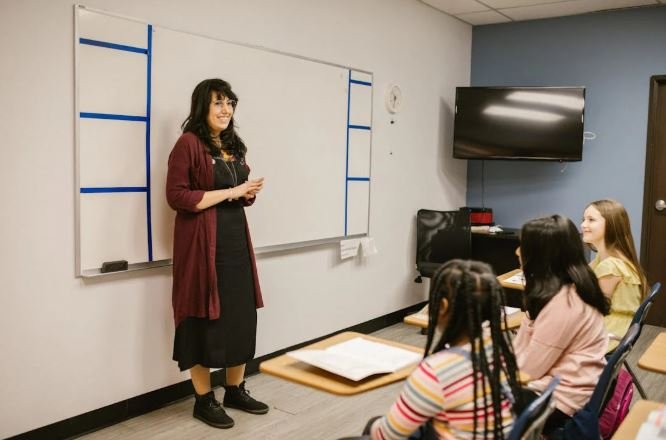Teaching is considered to be one of the most gratifying and rewarding professions. When it comes to the role they play in the development of their pupils, primary school teachers are right at the frontline, guiding children through the early years as they need to learn the fundamental skills necessary for future education literacy, numeracy, and how to interact with others.
What Does a Primary School Teacher Do?
Primary School teachers educate children aged 5 to 11 and help them develop a solid academic and social foundation. Their responsibilities include so much more than teaching a lesson planning the lesson, managing the classroom, and creating a positive learning environment.
Key Responsibilities of a Primary School Teacher:
- Establishing lesson plans that are tailored to the national curriculum
- Teaching core subjects like Math, Science and English
- Examinations, and assignments, to assess students’ progress
- Promoting student and emotional growth
- Handling student behavior and maintaining discipline
- Differentiating instruction for different learning styles
- Informing parents and guardians about students’ performance.
- Working cooperatively with other teachers and school administrators
Essential Skills for Primary School Teachers
To succeed in this role, aspiring teachers must develop several key skills:
- Communication Skills Articulating Ideas to Young Learners
- Composure and Flexibility Engaging students of varying learning styles
- Imagination Making lessons fun and hands-on
- Time Management Teaches, lesson planning, and grading
- Leap Connecting with all of your students and getting them to learn.
- Empathy Getting to Know Learner Needs

Do You Need a Degree to Teach in Primary Schools?
Yes, to be a certified teacher in most countries requires a bachelor’s degree in education or a related field. But there are other routes available if your degree subject is different.
Common Educational Pathways:
- Bachelor’s Degree in Education (B.Ed.)
- This is the most straightforward route to becoming a primary school teacher.
- Teaching strategies, child development, curriculum planning, and classroom management are all areas it covers.
Bachelor’s Degree in Another Subject + Teacher Training
If you graduated from a different field (e.g. English, Mathematics), you can pursue a couple of teacher training programs such as a Postgraduate Certificate in Education (PGCE).
School-Based Teacher Training (SCITT & Apprenticeships)
A few schools provide School-Centered Initial Teacher Training (SCITT) or apprenticeships, whereby applicants work on the field and at the same time get a teaching qualification.
Postgraduate Teacher Training Options
For those who previously obtained a non-teaching qualification, postgraduate teaching degrees serve to ensure a switch into the field:
- Post-Graduate Certificate in Education (PGCE) 1 year practical alongside theoretical education.
- PGDE (Postgraduate Diploma in Education) is Similar to PGCE but with additional credits, often allowing candidates to proceed to a master’s degree.
- SCITT (School-Centered Initial Teacher Training) is A practical program that puts trainees right into schools with the mentorship of experienced teachers.
Why Is Classroom Experience Important?
Teaching is a skill and ability-based profession, and learning by doing is essential. Practical knowledge of student behavior, lesson delivery, and practical skills can all be developed by aspiring teachers through exposure in the classrooms.
Ways to Gain Teaching Experience:
- TCGs (teachers´ training colleges) (for teaching degree or PGCE)
- Help in Schools (teacher aide or small group support)
- Working as a Teaching Assistant (assisting teachers and learning in the process)
- Private Tutoring or After School Teaching (help with homework & learning difficulties)
Qualified Teacher Status (QTS) and Certifications
In many countries, obtaining QTS (Qualified Teacher Status) is a requirement. The process includes:
- United Kingdom PGCE and QTS assessments are required
- United States State Teaching License (you will need to pass a certification exam)
- Australia Valid Working with Children Check and completion of teacher training
How to become a primary school teacher
Obtain a Relevant Degree
It is important to pick the suitable degrees. Future teachers must make sure their program is accredited and meets both the expectations of local parents and their local education system.
Gain Classroom Experience
If they are to be a qualified teacher, candidates need to spend a lot of time in classrooms, observing experienced teachers and refining their teaching skills.
Pass the Required Exams and Obtain Certification
Teaching certification exams in different countries These may include:
- Literacy and numeracy tests
- Teaching skill assessments
- Background checks and children’s safety training
Apply for Teaching Jobs
At this fully qualified stage, applicants can apply for teaching jobs via:
- Government job portals (for public school positions)
- Private school job listings
- Direct applications to schools
- Recruitment agencies specializing in education
Continue Professional Development
There are many professional development opportunities available for teachers. This may include:
- Participating in teaching workshops and seminars
- Master’s in Education (M.Ed.)
- Specialize in fields such as Special Education, ESL (English as a Second Language), or STEM subjects.

Common Challenges Faced by Primary School Teachers
- Heavy Workload in Lesson planning, grading, and administrative work.
- Behavioral Management Managing disruptive students to maintain classroom discipline can be challenging.
- Adapting to Curriculum Changes Curriculum changes at schools are pretty common which teachers need to accommodate.
- Emotional Demands A major component of being a teacher is having to handle students’ emotional and behavioral issues; this necessitates a sense of patience and empathy.
Advantages of Becoming a Primary School Teacher
- Changing Lives Teachers not only prepare students for future jobs but instill important life skills.
- Job Stability Teaching is a profession that never goes out of demand, hence a stable career.
- Career Growth Opportunities Teachers can use their experience and training to become a Head of Department, School Principal, or Education Consultant.
- Work-Life Balance Although teaching is challenging, school holidays allow time off and professional development.
Conclusion
A profession such as a primary school teacher is both rewarding and purposeful. You have to be committed, properly qualified, and have work experience in the classroom.
Hence, if you follow these steps obtaining the required degree, gaining teaching experience in schools, acquiring the school’s certifications, and constantly improving professional skills you will surely find a successful career in this field of education.
Teaching is not just a job it’s an opportunity to inspire, educate, and positively impact the lives of young learners. If you’re an educator at heart, teaching primary school is the right path for you.


